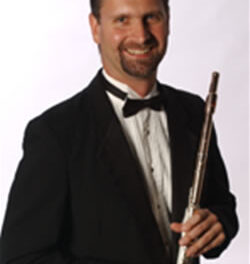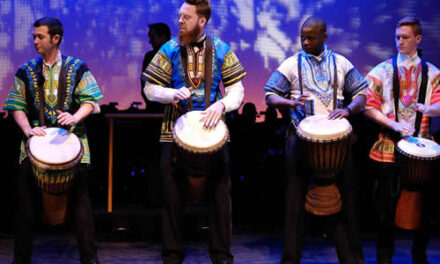Having violinist Joshua Bell on the program assured a sellout crowd for the July 1 concert in Dana Auditorium on the verdant campus of Guilford College. Principal Conductor Gerard Schwarz’s eclectic program emphasized refined string playing. Stable personnel and strong commitment from the musicians have helped the Eastern Philharmonic maintain a very high professional standard over several seasons of guest conductors. This is Schwarz’s first full season at the helm, and this concert revealed some of the effects of his approach to music.
Aaron Jay Kernis (b.1960) composed his String Quartet No. 1 in 1990. It was written in the wake of a period of doubt about what elements to include in his personal style. The score is more “classical” than usual for his works. It is known as “Musica celestis” after the slow movement which, according to Steven Ledbetter’s program note, “was inspired by medieval imagery of angels singing God’s praises eternally.” The composer arranged the movement for string orchestra, the version Schwarz led. It begins even more quietly than Barber’s “Adagio,” to which it is sometimes compared. The orchestra barely whispered the opening, and little of the piece rises above pp. Sections are played exactly in step as one player, with unified dynamics and phrasing. The conductor kept tight control of the tension, playing it out and reining it in expressively. There were fleeting moments when the eerie high harmonics reminded me of the “Grail Theme” in Wagner’s Parsifal and similar elements in Lohengrin. Kernis’ lovely and moving work was warmly received.
Lush, late Romantic writing for strings abounds in Schwarz’s own arrangement of music from Der Rosenkavalier, by Richard Strauss (1864-1949). The professional musicians gave Schwarz everything he asked for – rich string sound, brilliant but carefully balanced brass, and warm and expressive woodwinds. More than most interpreters, this conductor whipped up the excitement. During the opening musical portrayal of Octavian and the Marschallin, the whooping of the horns certainly marked the thrust of the lover’s tryst!
No composer’s music better fits a hot summer evening than the spare and chilly scores of Jean Sibelius (1865-1957). Only violinists with every string technique in their armory need attempt the Finn’s Violin Concerto in D Minor, Op. 47. Anticipation of the much-praised Joshua Bell’s performance resulted in an early sell-out of the hall, and there was a line of people hoping for returned tickets. Big names do not always produce great artistic results, but any doubts evaporated as Bell, dressed casually in black, coaxed the hushed entry from his magnificent 1713 “Gibson ex Huberman” Stradivarius before really digging in with his bow. What pristine highs, what gorgeous harmonics! Bell is now more physically demonstrative than he was in his earlier years (for example, on the Spoleto Festival USA’s chamber music series). His overall conception of the Sibelius is warmer than most – global warming at work, perhaps… – but his insight and total involvement were beyond question. Schwarz provided perfectly gauged accompaniment. Despite being recalled many times during the standing ovation, Bell (understandably) eschewed playing an encore, for he had given his all during the Sibelius.












